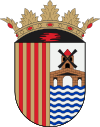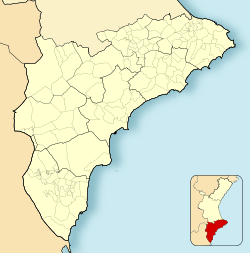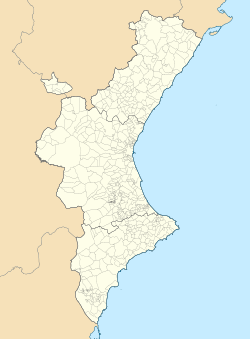Bigastro facts for kids
Quick facts for kids
Bigastro
|
||
|---|---|---|
|
||
| Country | ||
| Autonomous community | ||
| Province | Alicante | |
| Comarca | Vega Baja del Segura | |
| Judicial district | Orihuela | |
| Area | ||
| • Total | 4.10 km2 (1.58 sq mi) | |
| Elevation | 24 m (79 ft) | |
| Population
(2018)
|
||
| • Total | 6,702 | |
| • Density | 1,634.6/km2 (4,234/sq mi) | |
| Demonym(s) | Bigastrense | |
| Time zone | UTC+1 (CET) | |
| • Summer (DST) | UTC+2 (CEST) | |
| Postal code |
03380
|
|
| Official language(s) | Spanish | |
Bigastro is a small town in the Valencian Community in Spain. It is located in the southern part of the province of Alicante. In 2005, about 6,450 people lived there. Bigastro is part of a region called Vega Baja del Segura.
Contents
A Look Back: Bigastro's History
Bigastro has a long and interesting past. It goes back many centuries.
Ancient Times
Archaeologists have found old sites in an area called La Loma. These sites date all the way back to the Bronze Age. This shows that people lived here a very long time ago.
The town, once known as Bigastrum, was even a special place for a bishop. This was during the time when the Byzantine Empire ruled parts of Spain. Later, the Visigoths took control of the area.
How the Town Began
Bigastro got its name from a place called Lugar Nuevo de los Canónigos. This was where the canons (religious officials) from the Orihuela cathedral lived. They used to have power over this land.
In 1701, after some disagreements, the church allowed Bigastro to be founded. It started with three estates where 24 families lived. This was the official beginning of the town we know today.
Life in Bigastro: Economy and People
Bigastro has changed over time in how its people make a living.
Making a Living
When Bigastro was first founded, people mainly grew flax and hemp. These plants were used to make textiles. Later, in the 1800s, the textile industry became less important. People then started growing citrus fruits and other crops that needed irrigation.
Today, Bigastro also has industries. These include construction and manufacturing. This means people build things and make products in factories.
Who Lives Here?
In 2005, Bigastro had 6,450 residents. About 11.79% of these residents were from other countries. The largest group of foreigners came from the United Kingdom. They made up 22% of all the foreign residents.
Places to See and Things to Eat
Even though Bigastro is a young town, it has some special places and delicious food.
Important Buildings
You can still see some old landlord's homes in Bigastro. There are also old farmer's houses spread around the area.
One very important building is the Church of the Virgin of Bethlehem. Inside this church, you can find a beautiful sculpture of Saint Joachim. This sculpture was made by a famous artist named Salzillo.
Yummy Local Food
Bigastro has some traditional dishes that are very popular. These include a hearty stew and rabbit with rice.
The town is also known for its delicious pastries. Some of these sweet treats are almojábanas, toñas, almendrados, monas, and soplillos. They are perfect for anyone with a sweet tooth!
Friends Around the World
Bigastro has special connections with two other towns in different countries. These are called "twin towns."
 France - Le Vigan (Gard), since 2002
France - Le Vigan (Gard), since 2002 Italy - Cisano sul Neva, since 2002
Italy - Cisano sul Neva, since 2002
Fun Times: Festivals and Traditions
Bigastro loves to celebrate! The town has many exciting festivals throughout the year.
The main celebrations are dedicated to Saint Joachim in August. These include fun night festivals and stalls. Other important festivals are:
- El Rosario de la Aurora, celebrated every Sunday in October.
- The festivals of the Santa Cruz.
- The Romería de San Isidro.
- The festival of Santa Ana.
Bigastro also has a strong musical tradition. The Union Musical Band of Bigastro has been playing music for over a hundred years!
Saint Joachim is often called El Abuelo (The Grandfather) by the locals. In October 1993, the town celebrated 200 years since his sculpture first arrived in Bigastro. They even unveiled a new sculpture of their patron saint.
Famous People from Bigastro
- Francisco Grau Vegara: He was the person who wrote the music for the Spanish National Anthem.
See also
 In Spanish: Bigastro para niños
In Spanish: Bigastro para niños
 | Selma Burke |
 | Pauline Powell Burns |
 | Frederick J. Brown |
 | Robert Blackburn |





